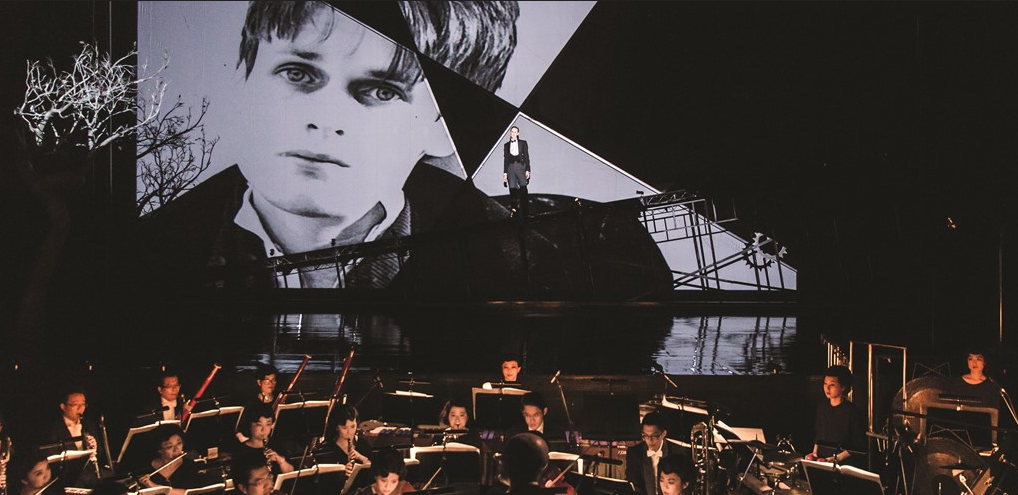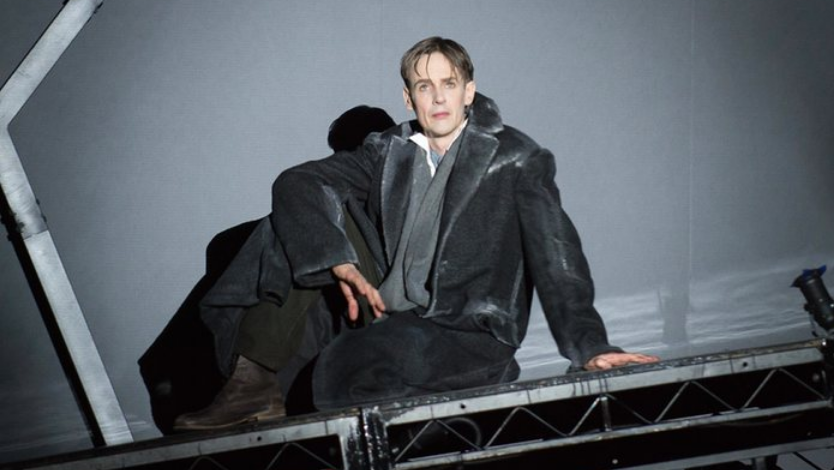Hottish on the heels of the William Kentridge designed and directed Wintereisse at last year’s Sydney Festival comes The Dark Mirror, a staging of Hans Zender’s 1993 ‘composed interpretation’ of Schubert’s greatest song cycle for tenor and chamber orchestra. Both stagings take a multimedia approach with ample use of video projection, but there much of the comparisons end. Zender’s reworking of Schubert is a whole new musical ballgame, while director and designer Netia Jones’ involving dramatic approach integrates her soloist – in this case a hauntingly tormented Ian Bostridge – more tightly into the overall conception than Kentridge did with his equally enthralling singer, Matthias Goerne.

Where Kentridge layers his vision on top of Schubert, Jones takes Zender’s extraordinary reimagining of the original as her starting point, to devastating effect. Starting deep inside the 26-piece orchestra with the sounds of trudging feet – more Foley realisation than music – the crystalline score glitters with icy spiccati and the tinkling of harp. Fragments of Schubert wheel in the air like the obsessive repetition of a scratched record, while Bostridge’s narrator sits staring mutely off stage. As memories are dragged painfully back to the present, he sings what at first feels like simply a re-orchestrated take on the opening Gute Nacht – until, that is, the verse about the mad dogs howling outside the house. Turning towards us, his visage death’s head white in the spotlight, Bostridge howls too, a potent use of the Sprechstimme that regularly, but sparingly, punctuates Zender’s reading.
Dressing her protagonist in a crumpled tailcoat, Jones’ dark mirror reflects 1920s cabaret and the flickering of silent movies, along with formal concert etiquette and much more. Guitar and accordion enhance the Weimar atmosphere – has Der Lindenbaum ever felt quite so much like Kander and Ebb’s Tomorrow Belongs To Me? – while Bostridge responds with a numbed, lopsided loneliness redolent of old Buster Keaton films. Arresting imagery comes thick and fast, though never so busy that it becomes a distraction. There’s a visual reference to Friedrich’s famous painting of The Wanderer above a sea of Fog and much is made of the idea of the doppelgänger, a contemporaneous Schubert song that surely wouldn’t have been out of place in Wintereisse. The projected landscapes are immaculate and powerful, while moments when Bostridge gazes stunned at matinee idol images of his younger self conjure a tremendous sense of desperation.
The storytelling continues for the first half of the cycle until, with the hollow stillness of Einsamkeit (Loneliness), it seems the narrator is able to go no further. Bostridge bounces back as the protagonist himself, clad in romantic travelling attire, for a spirited Die Post, before ominous timpani and tam tams (Zender employs three percussionists!) and snarling brass implode into the nightmare of the second half with its ill-omed crows, its storms and its hallucinatory cemetery. Täuschung (Delusion), which finds Bostridge as a befuddled concert singer whose sheet music no longer exhibits signs of coherence, echoes a dream that must have haunted many a performer.

But it is the final five songs that land the emotional body blows. A deeply felt Der Wegweiser (the Signpost), a still, bleak Das Wirtshaus (The Inn) and a hollow-eyed Die Nebensonnen (The False Suns) see Bostridge mining the text for all it’s worth before the wheel turns full circle in Der Leiermann (The Hurdy-Gurdy Man) and we experience the awful prediction of what this storyteller is destined to become.
If Jones and Bostridge put few feet wrong in a performance that keeps just the right separation between art and audience involvement, they are ably supported in the pit by a fine line up of musicians from the West Australian Symphony Orchestra. Baldur Brönnimann keeps things ticking along nicely, though there’s the occasional rocky moment between orchestra and soloist where perhaps the rhythmic pulse needs to be pushed to the fore. There was also an agonising trombone solo in Wasserflut on opening night, though Zender’s writing here makes nigh on impossible demands on any player. Generally though it’s a score to let your ears take a wallow in, and Brönnimann really gives it its due.
With 30 years of Wintereisse under his belt, and several staged versions to boot, Bostridge is an ideal interpreter. His deep understanding of the text allows him to concentrate on getting it right in places where Zender’s technically tricksy demands are layered on top of the original Schubert. He’s at his finest in the middle register, where his plangent timbre lends a natural bleakness to Müller’s poetry. It may be Zender, but there are moments where the vocal line dips uncomfortably low. There are also a couple of high notes that lack body, while the soloist is buried in the onslaught of Die Stürmische Morgen (The Stormy Morning). But these are nit picks in what is generally a gripping and psychotically informed reading.
It should also be said that this kind of ambitious, one-off event is perfect Festival fare, and so credit to PIAF for bringing it down under. Returning to the idea of Kentridge versus Jones, both have a great deal to offer, but for me the scales tip in favour of Jones’ integrated approach where the viewer is given permission to join hands and journey alongside Bostridge’s fractured traveller on his bleak winter voyage of the soul. Take the trip – if you dare.
The Dark Mirror is at Perth Festival until February 11











Comments
Log in to join the conversation.